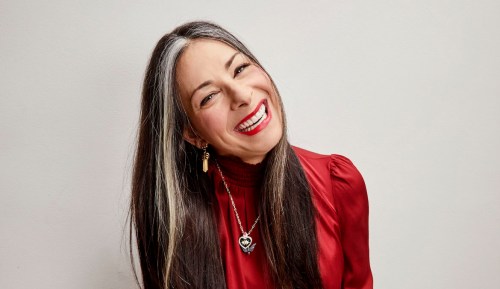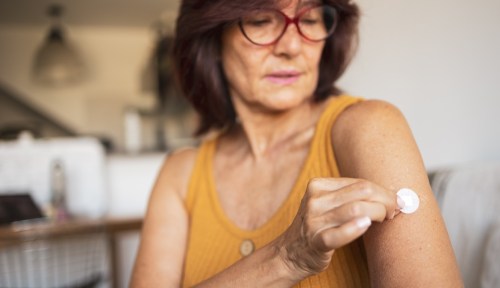Stacy London Wants To Flip the Script on Menopause and Aging Well
Stacy London's State of Menopause is shifting the conversation around menopause through education and product offerings.

When TV and media personality Stacy London started experiencing night sweats, mood swings, and an MIA period back in 2016, it didn’t even occur to her that she might be entering perimenopause. “My anxiety was through the roof, my depression was through the floor, and I was having mood swings,” she says. “I would have hot flashes in the middle of a conversation and forget what I was saying mid sentence, and my skin would get so dry that I would itch and itch and itch in public, and I felt completely out of control.”
At the time, she assumed the symptoms came as a result of a recent surgery and grief after a personal loss, but when a company reached out to her about a new brand they were developing for menopausal women, a lightbulb went off in her head. “I was in tears by the end of the conversation because I was so overwhelmed with a feeling that there was actually something happening here.’” London was so impassioned by the brand’s messaging—and fell so in love with its products when she was beta-testing them—that when the opportunity arose for her to take the venture over for herself, she leapt at it, and State of Menopause was born.
“I really started to think about how to re-position the company into a bigger message with a bigger meaning and movement, because the fact that no one is talking about this in and of itself,” says London. “Menopause isn’t talked about a lot, and there’s a lot of misunderstanding around the actual symptoms and the fact that it isn’t just a middle-aged, cisgender white woman problem.”
For example, she was struck by the lack of information out there for people who were experiencing symptoms at younger ages because of health issues like breast cancer, endometriosis, hysterectomies, and premature ovarian insufficiency, as well as how menopause relates to gender transitions, gender non-binary people, and intersex people. As she puts it, “There was a much bigger conversation to be had about the kind of shame and embarrassment that these symptoms can cause.”
This historic lack of conversation has left many people—London included—largely in the dark about what to expect from menopause. For instance, a study from Bonafide found that 45 percent of participants didn’t know the difference between perimenopause and menopause, and that 73 percent of them don’t treat their symptoms at all.
With that in mind, State of Menopause’s product offerings address the entire range of issues that come along with menopause’s hormonal shift. They fall into four categories, each of which is designed to target a different menopausal symptoms.
The “cooling” line includes a moisturizer, facial spray, and supplement that help address hot flashes. “A lot of cooling products can dry out your skin, so we went that extra mile to make sure that we had products that could nourish and moisturize your skin while also keeping it cool,” says London.
The “hydration” category is meant to moisturize the “sandpaper-like” skin that tends to happen due to the loss of estrogen people experience during menopause. “We wanted to make sure we had products that were rich enough to deliver hydration but that would also be absorbed quickly so that if you wake up with night sweats you aren’t covered in goop,” says London.
There’s also a set of “rest and renew” products that has a CBD body oil for muscle fatigue, an arnica cream that you can use for joint pain, and potent lavender bath salts for relaxation, and a “strength” category that includes a supplement and face mask meant to aid with hair loss, brittle nails, and a weakened skin barrier.
As London puts it, the goal of State of Menopause isn’t just to sell products, but rather to change the conversation around menopause as a whole. “I wanted to position the brand so that we could also become a hub for information and education and instill a sense of agency in a time that leaves a lot of people feeling really helpless,” she says. “Part of the reason I felt so strongly about this is because we can enter a conversation that is very quiet and make a lot of noise, and speak up and give a name to what is happening.”
Instead, she wants to flip the script on how we view this time in life. “We’ve turned menopause into this sort of badge of shame in aging… but really it’s an opportunity to look at the fact that our lifespans are growing exponentially,” says London. “One hundred years ago, you got menopause and you died. Now, you go through menopause and you’ve got 40 years in front of you. So this isn’t just about how you age, it’s about how you want to age, and what you want to become.”
Oh hi! You look like someone who loves free workouts, discounts for cutting-edge wellness brands, and exclusive Well+Good content. Sign up for Well+, our online community of wellness insiders, and unlock your rewards instantly.
Sign Up for Our Daily Newsletter
Get all the latest in wellness, trends, food, fitness, beauty, and more delivered right to your inbox.
Got it, you've been added to our email list.










